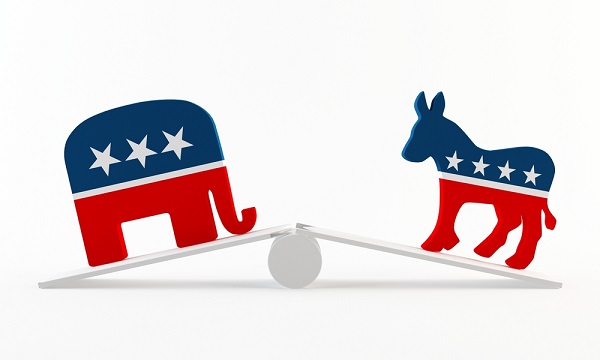 Some Senate Republicans aretrying to contain the political fallout from the latest Obamacarelawsuit, but their overall message isn't being heard. (Photo:Shutterstock)
Some Senate Republicans aretrying to contain the political fallout from the latest Obamacarelawsuit, but their overall message isn't being heard. (Photo:Shutterstock)
For the first time in years, Republicans are playing defense on health care in the midst ofan election campaign.
|A lot of them would like to keep bashing Obamacare and, now, bash the single-payer plans that are drawing more andmore support from Democrats. But the way they have gone after thehealth-care law is keeping their message from prevailing.
| Related: GOP candidates
Related: GOP candidates
sprinting away from ACA repeal
Congressional Republicans spent much of 2017 trying to pass legislation to make major changes toObamacare. Democrats said those bills would gut the law'sprotections for people with pre-existing conditions — andRepublicans have never come up with a solid response to thatcharge.
|Republicans compounded their problem by backing an ill-considered lawsuit to invalidateObamacare, including its provisions about pre-existing conditions.Josh Hawley, the Republican candidate for Senate from Missouri,supports the lawsuit as the state's attorney general. His opponent,incumbent Democratic Senator Claire McCaskill, isn't letting anyoneforget it. Hawley says that he favors legislating new protectionsif the lawsuit succeeds.
|It's the same story in the West Virginia Senate race: ADemocratic incumbent, Joe Manchin, is up against a Republicanattorney general, Patrick Morrisey, who joined the lawsuit. Manchinis hitting Morrisey hard over the issue.
|Some Senate Republicans are trying to contain the politicalfallout from the lawsuit by introducing legislation they vow toenact if it succeeds. That legislation purports to prohibitinsurers from discriminating against people with pre-existingconditions, but it is poorly drafted. Its text requires insurers tocover people without regard to their health status, but does notappear to require the insurers to cover the conditions for whichthe patients need treatment.
|Republicans are on stronger ground defending their previouslegislative record, or would be if more of them were conversantwith the issues. There, the key item of contention is a part of theHouse Republican bill that would have let states apply for waiversfrom Obamacare's regulations. In states with waivers, insurerswould have been allowed to charge higher premiums to people whowent without insurance, got sick and then tried to sign up.
|In theory, that system would keep premiums lower by deterringpeople from gaming the system. Healthy people would have anincentive to buy insurance rather than wait until they gotsick.
|The bill would not have taken people with chronic healthconditions back to the situation they were in before Obamacare.Even in waiver states, they would have Obamacare's regulatoryprotections so long as they maintained continuous coverage. And itwould be easier to maintain continuous coverage than it had beenbefore Obamacare. The bill largely maintained Obamacare's subsidiesfor people without access to employer coverage, Medicare orMedicaid.
|Those with chronic conditions but no coverage, meanwhile, wouldhave access to government-financed high-risk pools. These poolswere, admittedly, oversubscribed before Obamacare. But thesubsidies for people in the individual market and the regulatoryprotection for those who maintained coverage would both work toshrink the applicant pool.
|It should also be remembered that, especially in thepost-Obamacare landscape, state officials would have a powerfulpolitical incentive not to jeopardize affordable coverage forpeople with pre-existing conditions. The current campaign is itselfevidence that the goal of keeping them covered has strong politicalsupport.
|None of this puts the Republican legislation beyond critique.The Congressional Budget Office, which has long reflected theassumptions of liberal policy experts on health issues, assertedthat the waivers could cause serious harm to insurance markets. Itsprojection, however, partly reflected its confidence that endingObamacare's fines on people without insurance — another feature ofthe Republican bill — would have large destabilizing effects. TheCBO has backed away from that view; and anyway, the fines havesubsequently been ended in different legislation.
|But there is certainly a policy debate to be had on theseissues. It's too bad for the Republican candidates this year thatso few of them have shown any ability to engage in it.
Ramesh Ponnuru is a Bloomberg Opinioncolumnist. He is a senior editor at National Review, visitingfellow at the American Enterprise Institute and contributor to CBSNews. This column does not necessarily reflect the opinion of theeditorial board or Bloomberg LP and its owners.
Read more about what's in store for the ACA thiselection season:
- What the Texas Obamacare lawsuit means formidterms
- States attacking ACA's pre-existing conditionprotections have the most to lose
- GOP abandonment of ACA a gift forDemocrats?
Copyright 2018 Bloomberg. All rightsreserved. This material may not be published, broadcast, rewritten,or redistributed.
Complete your profile to continue reading and get FREE access to BenefitsPRO, part of your ALM digital membership.
Your access to unlimited BenefitsPRO content isn’t changing.
Once you are an ALM digital member, you’ll receive:
- Critical BenefitsPRO information including cutting edge post-reform success strategies, access to educational webcasts and videos, resources from industry leaders, and informative Newsletters.
- Exclusive discounts on ALM, BenefitsPRO magazine and BenefitsPRO.com events
- Access to other award-winning ALM websites including ThinkAdvisor.com and Law.com
Already have an account? Sign In
© 2024 ALM Global, LLC, All Rights Reserved. Request academic re-use from www.copyright.com. All other uses, submit a request to [email protected]. For more information visit Asset & Logo Licensing.



